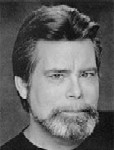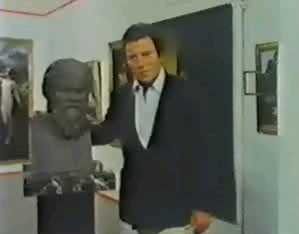David Abrams has unveiled his first January review since returning from Iraq. And it’s Kirstin Allio’s Garner. And Dan notes that Garner, recently described by Mr. Segundo in Show #23 as “The Rockford Files, but more literary,” is nominated for the Art Seidenbaum Award for First Fiction.
Month / March 2006
But A Full-Scale Nervous Breakdown, Complete with Men in White Suits, Would Really Make Laura Miller Do the Happy Dance!
Laura Miller: “One of the most interesting and newsworthy response I ever got was when I asked a novelist who’d just written (but not yet published) a memoir, ‘People often find that when they write about their past, the process dredges up old memories they’d entirely forgotten. Was there anything like that with this book that really surprised you?’ He told me he’d remembered being molested by one of his parents’ friends as a child!”
The Bat Segundo Show #24
Author: Liz Perle
Condition of Mr. Segundo: Vengeful and nostalgic for bad investment decisions.
Subjects Discussed: The quiet contract, what power means, responding to Ariel Levy’s review, the emotional middle class, lying to partners about money, conspicuous consumption, status, the two tiers of women-centric economics, guilt, women not being allowed to talk about money, describing women with aesthetic qualifiers, money and marriages, how younger women view money, gender income disparities, political obstacles, Caitlin Flanagan, value shifts over the past thirty years, on being a Target and IKEA queen, materialism, working class economics, Larry Ellison, David Denby’s American Sucker, and the “exclusivity” of quotes.
The Bat Segundo Show #23
Authors: Dan Wickett and Kirstin Allio
Condition of Mr. Segundo: Snubbed and pining for Beelzebub.
Subjects Discussed: The ideal of the perfect sentence, Faulkner, research, New Hampshire, 1920s vernacular, the controversy of Mrs. Heald, drafting Garner, agents and literary fiction, literary influences, Wallace Stegner, naming names, cemeteries, the difficulties of writing about girlhood, and being skeptical about craft.
Well, We Yanks Have Benedict Arnold, the Baltimore Riots & McCarthyism In Our History…For a Start
Peter Carey on James Frey: “It’s trite to say it, but the US is a country run by liars going to war on a fantasy, so it’s interesting to see people getting self-righteous about James Frey. And by the way, if you’re going to publish a memoir by an addict in rehab, everyone knows that one of the corollaries of addiction is lying. So I don’t see why everyone gets into such a fucking uproar because an addict is a liar! Oprah acted like a total bully: talk about about crushing a butterfly on a wheel–or a cockroach on a wheel– because that’s what she did on television to this little creep.” (via Galleycat)
Yeah, Man, But It’s a Dry Heat!
Bill Paxton went nuts when The View host Joy Behar asked fellow Big Love actor Chloe Sevigny about the infamous Brown Bunny BJ. An “insider” objects: “‘The View’ is a a show that is broadcast to housewives all over Middle America. [Oral sex] isn’t the kind of thing you talk about.”
If we’ve learned anything from covering the book beat, it’s that Middle America sure as hell needs to know about oral sex. Now more than ever. In fact, while we’re at it, why don’t we see Mike Ditka asking football players about cunnilingus? Just to level the playing field and all.
As for the reports of Paxton “exploding off-camera,” let us be the first to say that somebody at the New York Daily News has a sense of humor.
Attention Washington DCers
Tayari Jones is having a party on March 20 at Busboys and Poets. And aside from the fact that I can personally vouch that Tayari is both a good novelist and an exceptionally amicable person, the solipsists here, no doubt thinking “What’s in it for me?” might wish to know that there will be canapés and stuff.
But I’ll up the ante. If you’re a Washington, DC local and you email me a photo of yourself with Tayari AT Busboys and Poets, then, when BookExpo comes along in May (along with the expected cocktail shenanigans), find me and I will personally buy or abscond with (if they’re free) two drinks: one for me, one for you. And we will have ourselves a crazed chat for at least twenty minutes. Granted, it’s quite likely that I’d talk with you anyway. Among literary geeks, I’m a sociable sort. Fueled with enough liquor, I’d talk with just about anybody. Including the beverage in my hand or the sad man who plays the piano. But since incentive is the name of the game…
Roundup
- Another day, another Robert Birnbaum interview. This time: Uzodinma Iweala.
- Concerning the Jonathan Ames testicle controversy, it seems that the testicle is ahead of the shadow by a ratio of 5 to 1. Whether this will have any long-term impact on future perceptions of Jonathan Ames books remains to be seen, but there’s a rumor floating around that Augusten Burroughs has been considering “an accidental photo” for his next book. Just remember that Jonathan Ames was the first one there.
- It seems that only John Freeman is allowed to talk with David Foster Wallace. That’s two articles in seven days. What deal did he cook up with Bonnie Nadell? Or is John Freeman part of the DFW inner circle of “approved” people? (Former Freeman link via Scott)
- The history of mustard.
- Believe it or not, Ivan Turgenev’s one and only play, A Month in the Country, is playing in North Carolina. Free Gutenberg text here. Background info here.
- It started with a harmless exchange of information, but Maud and I have been trying to figure out why the Graham Greene-Anthony Burgess relationship was so strange. I sent Maud an interview with the two authors that I had read in Burgess’ But Do Blondes Prefer Gentlemen?. Jasper Milvain dug up more, pointing out that Greene disowned the interview, claiming that “Burgess put words into my mouth which I had to look up in the dictionary.” The two authors fell out, apparently by 1990, when Burgess published his second autobiographical volume, You’ve Had Your Time. And while I don’t entirely trust Wikipedia, the Anthony Burgess entry notes, “In 1957 Graham Greene asked him to bring some Chinese silk shirts back with him on furlough from Kuala Lumpur. As soon as Burgess handed over the shirts, Greene pulled out a knife and severed the cuffs, into which opium pellets had been sewn.” Now if that latter tidbit can be corroborated, then it’s just possible that the Burgess-Greene relationship might be one of the strangest in literary history. As soon as I get an opportunity to hit the library, I’m going to follow up on all this. Did Burgess and Greene love to hate each other? Or did they hate to love each other? Or was it a little bit of both? Perhaps some bona-fide authorities might have some answers to all this.
[UPDATE: Jasper has an update on the Greene-Burgess contretemps, with some citations. And in the comments to this post, Jenny Davidson offers some materal from the forthcoming Biswell biography, which apparently deals with Graham Greene at great length.]
Fantasy: A Genre Tailor-Made for Political Fiction?
Henry Farrell on China Miéville: “For Miéville, fantasy shouldn’t merely justify what is, in the service of a self-defeating escapism or consolation; to the extent that it does, it’s merely remaking our political world, not Remaking it. Instead, fantasy should become a way of arguing about our social condition, of re-presenting our dilemmas, and creating a space for the imagination in which we can identify new possibilities of action. Fantasy can have a kind of political force that the ‘realistic’ novel can’t, precisely because it doesn’t take the real for granted.”
Jews Who Fight
Jill Soloway sends word that she’ll be hosting Jews Who Fight on Thursday, March 16 at 7:00 PM, at Joe’s Pub, located at 425 Lafayette Street in New York. Performers may include Jill and Faith Soloway, David Brendel, Jonathan Goldstein, Jessi Klein, Eddy Portnoy, Jamie Denbo, Jssica Chaffin and Jeremy Chatzky.
Brigid Strikes Back
The first issue of A Public Space, a new quarterly edited by yearlong Paris Review editor Brigid Hughes, is out, and the contents look quite appetizing. Rick Moody, fiction from Charles D’Ambrosio and Kelly Link, poetry, Haruki Murakami on grapefruit, an essay from Marilynne Robinson. Return of the Reluctant, which can not say no to such a motely crew, plans to get its hands on this and report back our findings.
Against Sexism
 Sexism is a woman making two-thirds the salary that a man earns for the same position. Sexism is a man getting time off to be with his family, but a single mother having to work continuous overtime to prove that she’s a team player, hoping to hell that the kids are all right. Or the troubling statistic that a woman is paid 30% less because she is too scared to ask for a pay raise.
Sexism is a woman making two-thirds the salary that a man earns for the same position. Sexism is a man getting time off to be with his family, but a single mother having to work continuous overtime to prove that she’s a team player, hoping to hell that the kids are all right. Or the troubling statistic that a woman is paid 30% less because she is too scared to ask for a pay raise.
Sexism is the fact that there aren’t nearly as many restrooms for women as there are for men. Sexism is any number of architectural sleights that don’t take into account a woman’s physiology.
Sexism is any government that would exert control over a woman’s uterus. Sexism is our society not providing for the realities of sexual intercourse, of letting a man walk away while a woman must scrape together hard-earned dollars to either raise or not have the kid. Sexism is a conservative family that will not support a pregnant teenager facing such a predicament.
Sexism is Frank Capra showing Donna Reed to be a freakish old maid in the Pottersville parallel universe. Or Sharon Stone getting $15 million for Basic Instinct 2 to take off her clothes and simulate sex and $2.5 million for Casino to deliver a performance. Or the fact that most film directors are male.
Sexism is a woman being unable to fuck whoever she wants and however she wants without being called a slut, while a man can be polymorphously perverse without reproach. Sexism is also the idea that an older woman can’t be sexy, while such dinosaurs as Jack Nicholson (and even Woody Allen) are given carte blanche. Sexism is the denied orgasm, or a woman going down on a man, but a man too lazy for cunnilingus. Sexism is a woman being considered unattractive for being at least ten pounds overweight, while a man’s prominent paunch goes unremarked upon. Sexism is a man being able to wear the same suit to two different social affairs, where a woman who wears the same dress or the same shoes is considered cheap or a tramp.
Sexism sometimes comes down to a gender chasm of maintenance. The billion-dollar makeup industry, the pressure to squeeze into a tight skirt, the unseen efforts to hide wrinkles or crow’s feet or sagging breasts.
We know all these things. Or we should know them. And yet all of the silent heartbreak that have resulted because of these mentalities could have been avoided with consideration or a few simple choices. If not through a piece of legislation like the Equal Rights Amendment, which has been in limbo now for over eighty years, then perhaps through a wholesale rejection of the consumerist and cultural forces that continue to tell women that they are second-class citizens. Those who would dismiss a women’s-centric film, even a skillfully made one, as a “chick flick” or a book “chick lit.” Those who would declare a particular talking point “too girly.” Those who would declare a reactionary like Caitlin Flanagan as the major female voice in one of our most distinguished weekly magazines or who would keep a major Sunday book review section almost the exclusive territory of white males.
It is now the 21st century. Women, in fact, outnumber male college graduates. And yet where is their presence? According to the American Association of University Professors, in 2003-2004, 38% of all faculity are women and women professors earn 80% of their male counterparts. There has never been a woman presiding over the White House, unless you count Geena Davis. Only 14 out of 100 U.S. Senators are women. Only 59 (a mere 11%) of 435 Representatives are women.
One doesn’t even have to be a feminist to pay attention to these things. And yet we allow these discrepancies to linger, hoping that some elusive force will figure this all out. But as long as we remain silent and as long as we look the other way hoping that the problem will rectify itself, we contribute to the horrible divide. We become sexists, men and women, in our own quiet and comfortable way. And isn’t that a pity. Because we can do so much better.
Not Another One
RIP, Gordon Parks. A photographic genius and the director of one of the all-time great blaxploitation flicks, Shaft.
And Speaking of Lackluster Narratives…
The Taste Runs in the Family
Since Dave Itzkoff has seen fit to produce his top ten science fiction novels “for the ages,” I asked Brad Itzkoff, who is Dave’s older brother, to offer his top ten literary choices of all time. Brad tells me that he’s always been “a good older brother” to Dave. The two brothers have shared many days watching episodes of Hogan’s Heroes together and can apparently quote entire scenes from memory. Dave has inherited much of his literary sensibiliites from his older sibling.



So here’s Brad Itzkoff’s list of favorites, with commentary, by the older brother of the writer of the Book Review’s new science fiction column. Titles are listed in alphabetical order.
Atlas Shrugged (1957)
By AYN RAND
Dude. I read this when I was a teenager and it blew me away. I still live by Ms. Rand’s philosophy. The “Money” speech still gives me goosebumps. Plus, rough sex scenes! Always the stuff of literature! That’s the only reason that a chick is on the list. By the way, I have a nude photo of Ayn Rand that I’m selling on eBay if anybody wants it!
The Da Vinci Code (2003)
By DAN BROWN
Arranged in very short chapters that you can read between commercial breaks, there’s a reason why this novel has attained its stature as an instant classic. Just edgy enough to make you think at times, just restrained enough not to be offensive. The way a novel should be.
The Firm (1991)
By JOHN GRISHAM
Before I read this breathless thriller, I had no idea what it was like to be a lawyer. I figured it was a bit like being Perry Mason. But, boy, am I glad Grisham, a true genius if ever there was one, set me straight!
Hawaii (1959)
By JAMES MICHENER
My father gave this book to me when I was sixteen. And he gave me an ultimatum: read it or move out. Well, of course, not having a job, I was obliged to read it. But as it turned out, pops was right! This was a manly book written by a manly man. One of the great novels of the twentieth century!
The Hitchhiker’s Guide to the Galaxy (1979)
By DOUGLAS ADAMS
Yes, I know it’s science fiction. But it made me laugh. This book gets a space because it’s so easy to read.
Jonathan Livingston Seagull (1972)
By RICHARD BACH
It’s not just an exciting story about birds, but it’s a parable for the modern age. I first read this after a bad acid trip as a teenager. Well, needless to say, I laughed my ass off! Then I read it again, with the Neil Diamond score playing in the background, and I must say that Bach taught me exactly how to live my life. Had it not been for Jonathan Livingston Seagull, it’s quite likely that my little brother wouldn’t have been the success he is at the New York Times! I’m so proud of him!
Love Story (1970)
By ERICH SEGAL
I don’t understand why people badmouth this book. It certainly lives up to its title. It’s a story. And it deals with love. What more can you ask for?
A Prayer for Owen Meany (1990)
By JOHN IRVING
I sobbed myself to sleep many times during the six months it took for me to read this long, long, LONG novel. Plus, dwarfs are funny!
Scarlett (1991)
By ALEXANDRIA RIPLEY
A sequel to Gone With the Wind unfairly derided. Ripley takes her cue from the bodice-rippers and gives you all the answers to all the questions that Mitchell failed to answer in her book. I don’t know about you, but a book without even the tinge of ambiguity really isn’t worth my time. Don’t let the fact that she’s a chick prevent you from reading this book!
The Stand (1978)
By STEPHEN KING
The most brilliant novel of all time, and possibly the longest book I’ve ever read. I’ve spent far too many evenings staring into the distance, wondering when Captain Trips will come and kill me. Dave reminds me it’s just a novel, although I think Stephen King is a prophet! M-O-O-N, that spells classic!
I’m Not A Commercial Fan, But There ARE Exceptions…
The Rolling Stones, circa 1964, sell Rice Krispies. (via MeFi)
London Book Fair
Chad Post offers some initial comments, with more to come from “the 51st most influential liteary person in the UK.”
Because Who After All Needs Artistic Context?
Chris Krauss: “Contemporary art has a way of putting people on the spot, but I found if you smoke a joint outside the museum, go inside, sit in front of the work, and see what it has to say to you, your guess will be as good as anyone else’s.”
New Book Reviewing Criteria
If the book isn’t bad or good, it could be good bad or bad good. It might also be good bad good, bad bad bad, bad good great, or a koob, because book critics are often burned out and there’s no real way to assess the book correctly.
Orange Prize Longlist Announced
The Orange Prize longlist has been announced. Among the nominees: Marilynne Robinson’s Gilead, Zadie Smith’s On Beauty, Ali Smith’s The Accidental, Sarah Waters’ The Night Watch, Meg Wolitzer’s The Position and Curtis Sittenfeld’s Prep.
“Da Vinci Code” Movie Ordered Pulled
The Christian Council of Korea has protested the May release of The Da Vinci Code: not because of any specific blasphemy, but because the CCK, being serious film fans, can’t see what good can come of teaming Ron Howard and Tom Hanks again for an overwrought Hollywood picture.
Steven Spielberg to Spare Us Santimonious Films in 2006
Spielberg has announced that he’ll be taking a break in 2006. The director announced that he didn’t understand why his “masterpiece,” Munich, was so unrecognized by the Academy and decided that “he didn’t feel like playing with toys” this year. (via Ghost in the Machine)
RIP Dana Reeve
As if Christopher Reeve’s untimely paralysis death was sad enough, Dana Reeve passed away. She was only 44. She did not smoke and yet somehow died of lung cancer.
[UPDATE: Elizabeth Crane offers some personal thoughts on Reeve’s death.]
New Quarterly Conversation Up
The latest issue of Mr. Esposito’s Quarterly Conversation is now up. There are essays from Daniel Green, Dan Wickett, Dave Munger and Derik Badman.
Ye Olde Reading Contest
Judges and brackets have been announced for The Morning News Tournament of Books. There are rumors going around that judge Dale Peck will take an axe to all the losers. But on the bright side, to demonstrate that he has a warm side, he will call the winner “the best writer of his generation.”
Listening Tip
RotR-endorsed Ian Rankin is hosting a BBC4 series in which crime fiction writers talk about the music that influences and inspires them. (via Sarah)
National Book Critics Circle Winners
They haven’t been posted at papers are reporting the following winners:
FICTION: The March by E.L. Doctorow
MEMOIR: Them: A Memoir of Parents by Francine de Plessix Gray
NONFICTION: Voices from Chernobyl by Svetlana Alexievich (Keith Gessen: translator)
BIOGRAPHY: American Promtheus by Kai Bird and Martin J. Sherwin
CRITICISM: The Undiscovered Country by William Logan
POETRY: Refusing Heaven by Jack Gilbert
This Geek Keeps Many Opinions to Himself. More Than You Could Possibly Know.
Several readers have alerted me to Dave Itzkoff’s science fiction column. For regular Tanenhaus watchers, Mr. Itzkoff’s uninformed stance on science fiction isn’t much of a surprise. I’ll have more to say after the weekend, but thankfully, Matt Cheney, Nick Matmas and Lucius Sorrentino are on the case.


